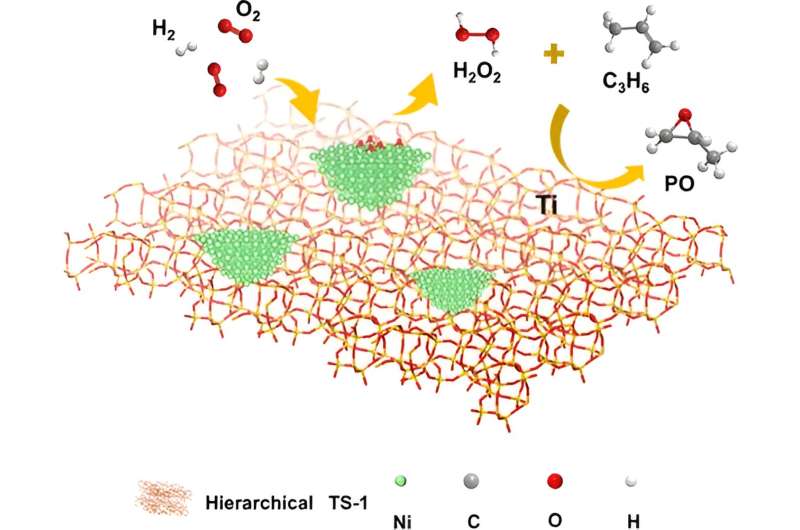This article has been reviewed according to Science X's and . have highlighted the following attributes while ensuring the content's credibility:
fact-checked
peer-reviewed publication
trusted source
proofread
Researchers develop non-noble nickel catalysts for efficient gas-phase epoxidation of propylene

Propylene oxide (PO) is a high value-added chemical intermediate. In comparison to conventional routes to produce PO, direct epoxidation of propylene with H2 and O2 is a green, efficient, and sustainable approach. However, the currently used Au catalyst in this approach is high-cost and with limited reserves. Therefore, it is urgent to develop highly-active non-noble catalysts for propylene epoxidation.
A research team led by Prof. Chen Xinqing from the Shanghai Advanced Research Institute (SARI) of the Chinese Academy of Sciences has proposed non-noble nickel catalysts supported on titanium silicate-1 (TS-1) zeolite, which exhibits excellent catalytic performance in the gas-phase epoxidation of propylene.
The research results were published in ACS Catalysis on July 27.
The researchers synthesized a series of non-noble Ni/TS-1 catalysts by the deposition precipitation method. They found that the strong metal-support interaction between Ni nanoparticles and TS-1 was the reason for their good catalytic performance in the gas-phase epoxidation of propylene.
The prepared 2% Ni/TS-1 catalyst reached a high PO selectivity of 76.8% and PO production rate of 151.9 g PO/(h·Kgcat). Its long-term stability at 200 °C exceeded 20 hours.
Moreover, the researchers investigated various characterizations of the catalyst to understand the reaction mechanism with the help of in-situ technologies. The results showed that metallic Ni promoted the reaction between hydrogen and oxygen for the in-situ synthesis of H2O2 and then oxidized propylene to PO. Theoretical calculations revealed that the passivation layer on the Ni surface enabled the production of H2O2.
More information: Wenqian Li et al, Highly Efficient Epoxidation of Propylene with In Situ-Generated H2O2 over a Hierarchical TS-1 Zeolite-Supported Non-Noble Nickel Catalyst, ACS Catalysis (2023).
Journal information: ACS Catalysis
Provided by Chinese Academy of Sciences




















